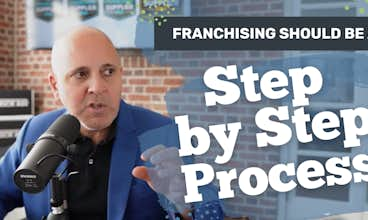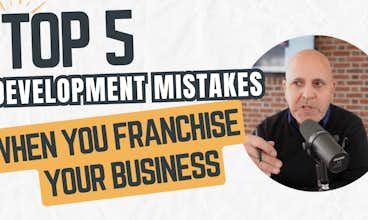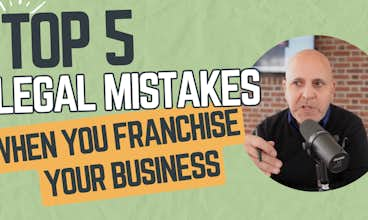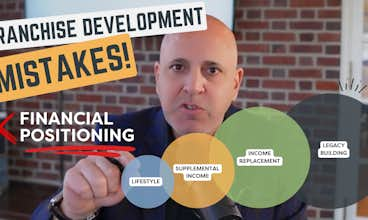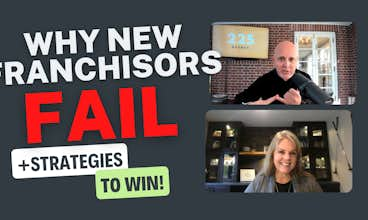Evaluating these four factors can clarify what franchising success looks like for you – and if it’s worth your investment.
Key Takeaways:
Entrepreneurs often find themselves at a crossroads when deciding if it’s worth it to franchise their business.
Successfully franchising your business requires time, money and effort over at least a five-year period, and it isn’t for everyone.
By evaluating four key factors, you can determine the ROI potential of franchising your business – and decide whether it’s worth it.
As a thriving entrepreneur, it can be difficult to decide on the best strategy for growing your business beyond its current stage – especially when it comes to franchising.
Despite its potential for scaling brands to new heights, franchising also requires a significant investment of time, capital and effort – and it isn’t right for every business. Because of that, it’s critical to ensure that the return on your investment is worth it before franchising your business. Still, when you don’t have experience in the franchise industry, determining whether franchising is worth it can seem daunting.
In this article, we’ll explore the steps for deciding whether or not franchising is worth it for you – and how to define what success looks like on your own terms as a franchisor.
Four Factors for Evaluating a Successful Franchise Investment
When it comes to franchising your business, timing is everything. Because of that, it’s critical to conduct an ROI analysis before investing your time, capital and energy into becoming a franchisor.
In particular, honing in on four key factors centered around your personal goals and your business’s ROI potential as a franchise system – including the years it will take to achieve success as a franchisor, the capital you’ll need to invest in your brand, and the time and effort you’ll have to commit to growing and scaling your business – can help you clarify whether franchising your business is worth it to you in the long run.
1. Five-Year Growth Journey
Like any good investment, franchise investments have a time horizon and must be evaluated over the appropriate timeframe to determine whether their ROI is worthwhile. In franchising, that time horizon is typically around five years.
When evaluating your business’s ROI potential as a franchise system, remember to consider the time you’ll have to invest in building and growing your brand – and what you expect to get out of that investment.
Development Phase
During your first 90 to 120 days as a franchisor, you’ll focus on building a rock-solid legal foundation for your franchise. This will include working with a franchise attorney to issue your Franchise Disclosure Document (FDD), prepare your franchise agreement and ensure that your franchise registration applications and other documents to start a franchise are in order. It will also include developing your franchise operations manual, preparing financial statements and similar tasks.
Seasoning Phase
As a new franchisor, you should expect to spend your first 18 to 24 months focusing on launching and seasoning your business. This should include growing your franchise system organically while spending money carefully.
During the seasoning phase of your new franchise, your focus as a franchisor might include the following:
Website. Building a unique franchise sales website that tells a compelling brand story and communicates the benefits your offering provides franchisees. Make sure to avoid generic content and encourage organic growth through authenticity.
Building unit economics. Selling franchises organically to friends, family and existing brand fans.
Franchisee validation. After onboarding your first few franchisees, over-supporting them in achieving success as franchise business owners. Their success will contribute to the financial health of your franchise system and will be invaluable for selling more units in the future.
During your first couple of years in business, there will likely be challenges to figure out along the way as a new franchisor. The best way to move through those challenges is to embrace continuous improvement – whether it’s making adjustments to your franchise operations manual, revamping your website or improving your marketing and sales strategies, finding the most efficient ways to operate is critical during this phase.
Acceleration Phase
From years three to five as a franchisor, expect to focus on acceleration and growth. This includes, but isn’t limited to, the following:
Improving franchisee validation
Building positive cash flow
Generating interest from private equity for reinvestment
During this phase, you will also position your business for further growth and operating a larger number of units across your franchise system.
2. Capital Requirements
When determining whether franchising your business is worth it, it’s important to assess the cost of franchising your business. Beyond your initial capital investment requirements, remember to include the ongoing costs associated with developing and operating your business. While evaluating your future franchise’s ROI potential, consider that certain expenses will be necessary during specific phases of your brand’s evolution.
Development Phase
Although the initial capital investment requirements for developing a franchise system vary, new franchisors should typically expect to set aside between $23,000 to $30,000 to franchise their business. These fees are generally related to legal and development services during your first 90 days as a franchisor. If you’re asked to spend capital above that range, it can be a good idea to ask questions and ensure that any additional expenditures are legitimate and necessary.Launch Phase
After launching your franchise system, your expenses as a new franchisor over your first two years in business will largely focus on attracting, onboarding, and supporting new franchisees in their success as franchise business owners. Because your success as a franchisor will depend on the success of your first several franchisees, building and leveraging their validation will be critical to franchise sales in the future. Franchisees’ economic success will also translate into a strong Item 19 of your FDD, which can help communicate the value of your brand to prospective buyers, so it’s important to invest accordingly.
In addition to the capital associated with recruiting franchisees and supporting them in opening their businesses, new franchisors should also plan to attend conferences and workshops and develop strong marketing and PR strategies to boost franchise sales.
While the costs of franchisee support, industry events and marketing can all vary depending on your business and industry, it’s important to include accurate estimates in your analysis to help determine your franchise system’s ROI potential.
Operations Phase
During years three through five, your costs as a franchisor will be focused on operating and growing your franchise system. Because spending money wisely is critical, building durable assets that will continue to generate revenue over time can be a smart business decision.
In addition to running ads and paid media, make sure to develop a custom sales website with a compelling brand story that sells itself, along with laying a strong foundation for your brand. It’s also a good idea to improve your franchise sales discovery process over time. By investing in durable assets as you go, you can save money while generating income.
3. Time and Team Commitment
When assessing the ROI potential of franchising your business, it’s important to consider the time you’ll have to invest in developing, seasoning and growing your franchise system.
It’s also critical to assess the people you’ll need to hire and pay to make your franchise brand successful. This might include professionals working in legal, marketing, franchise sales, development, human resources, training and more.
Five-Year Commitment
Building a thriving franchise system with satisfied franchisees and strong unit economics requires years of time and effort. When evaluating your franchise’s ROI potential, consider the elements of your Five-Year Success Plan and determine the time and effort necessary to achieve your goals. Consider whether you’re in a position to commit to seasoning and growing your franchise system over the next five years and, if so, what success should look like at the end of that period.
Building a Strong Team
Although there are plenty of “one-stop shop” franchise developers promising to handle every aspect of franchising in-house – from the FDD to legal, marketing, development, sales and more – in reality, there is no replacement for securing a team of highly qualified professionals who are experts in their fields.
While that doesn’t mean you need a huge team early on – plenty of franchisors achieve success with small teams of three or four – it does mean that you will eventually need to add additional members to your team as your brand grows. You may also need to outsource specialized work, such as legal or advertising, to professionals who are qualified and experienced enough to handle it competently.
During your ROI analysis, make sure to factor in team member salaries and professional service fees to determine whether the ROI would be acceptable to you as a franchisor.
4. Franchise Success Metrics
When you’re considering franchising your business, evaluating the key performance indicators that would impact your franchise system’s success is crucial for determining if franchising is right for you.
KPIs to monitor when assessing the ROI potential of your franchise include, but aren’t limited to, the following metrics:
Franchises sold. How many units have you sold?
Franchises opened. How many units have you opened? If this number is lower than the number of units sold, this can indicate a potential problem that may impact your ROI.
Franchisee sales and profitability. What will your Item 19 look like? How profitable are franchisees? What do their average gross sales look like?
Franchisee marketing ROI. How much does each franchisee spend on marketing – and what will they get back from those expenditures?
Franchisee validation. Are franchisees able to meet their economic goals? Are they adequately supported and willing to validate the franchise opportunity to prospective buyers?
Royalty sufficiency. Do the royalties you receive and collect from franchisees sufficiently exceed your operating costs?
Enhanced systemwide sales. Beyond generic numbers, what is the economic story of your franchise – and how will franchisees’ lives be transformed after buying a franchise business from you?
By tracking KPIs in your business, you can connect the dots between your numbers and your franchise system’s ROI – and even reduce some of your costs.
Defining Success on Your Own Terms
At the end of the day, success looks different for every business owner. Because of that, it’s important to define what it looks like for you, as a future franchisor, on your own terms. When deciding whether or not to franchise your business, remember that your work – and expenses – won’t end after your FDD is issued. In many ways, it will just be getting started.
By taking the time to assess whether the investment you will have to make in your franchise system in terms of time, capital and effort is worth it for you, you can ensure that now is the right time to franchise your business – and that you’re starting on the right track as a franchisor.
Are you considering franchising your business but don’t know where to start? We’re here to help! Contact us now.


